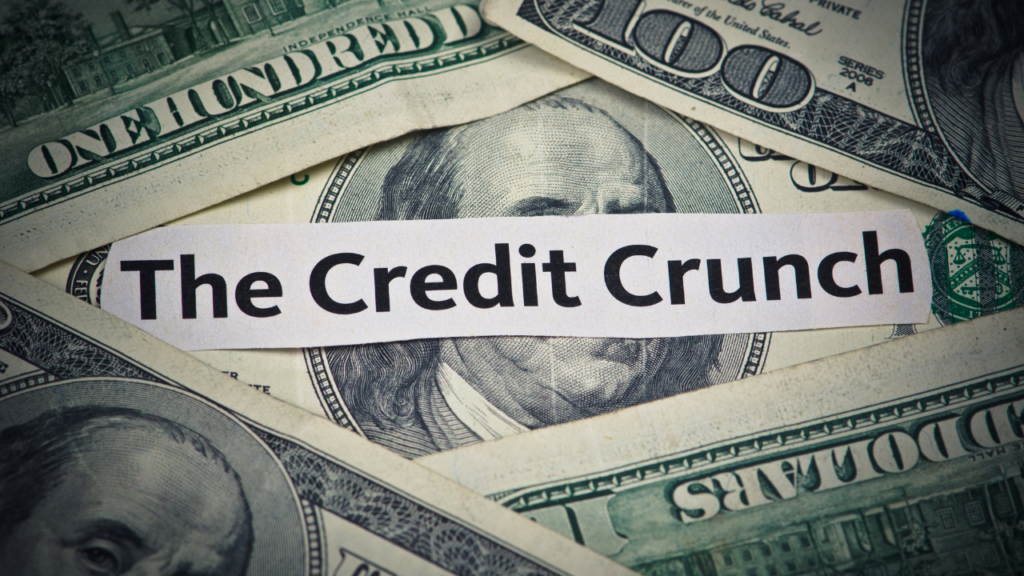
The financial world is continuously evolving, and in recent times, terms like “credit crunch” have regularly trended in the finance and business world. But what is a credit crunch, and why is it particularly concerning businesses and individuals?
What is a Credit Crunch?
A credit crunch is when banks and other lending institutions restrict the availability of credit, or loans, to consumers and businesses, usually caused by a sudden sharp increase in interest rates. This phenomenon often leads to a significant economic slowdown, with businesses struggling to expand, much less survive.
There is growing concerned about an imminent credit crunch following the recent increase in interest rates and the 20% forced raise by regulatory bodies in capital reserves for banks and lending institutions. The combined effects of these two factors mean that lending institutions and banks are finding it increasingly challenging to provide loans to consumers and businesses.
The rise in interest rates means that borrowing becomes more expensive, reducing credit demand. It also means that banks will push up interest rates on their lending, taking advantage of the increased demand for loans and reducing their risk.
The forced increase in capital reserves equally puts banks in a precarious position as they will have less currency available to lend to businesses and consumers. The coupling of these two factors creates a critical lack of liquidity, a bubble about to burst.
What could this mean for small businesses?
While some may argue that high-interest rates are an appropriate deterrent for taking out loans, the truth is much more complicated. Credit is the bedrock of any modern economy; without it, consumers and businesses alike could not invest in capital-intensive projects such as infrastructure, equipment, or development.
In such a scenario, small businesses will be the first to suffer. Access to funds is necessary for these businesses to create plans, implement strategies, or even keep their doors open. The economic consequences are disastrous, leading to halted production lines, reduced employment opportunities, and decreased overall economic activity.
If left unchecked, a credit crunch can trigger a recession, as businesses are forced to shut down, laying off employees in large numbers and sending shock waves throughout the economy. Families might lose their homes, and many see their savings accounts wiped out as they struggle to repay their debt.
Moreover, a credit crunch will impact the already depressed housing market, struggling to make headway following the economic crisis. Higher interest rates can inflate mortgage repayments, make houses less affordable, and further decrease demand in the housing market.
The moral hazard here is that banks will only want to take the risks inherent in lending out funds, especially with a guarantee of repayment. Instead of browsing through loan applications, they might be more inclined to hold onto the currency they already have or invest directly in low-risk opportunities like treasury notes or bonds.
The urgent need for government intervention
A looming credit crunch threatens the economy, individual consumers, and small businesses. A broader economic slowdown is just around the corner. While we must avoid this situation where possible, the heightened regulatory requirements and interest rates make it difficult. It is, therefore, incumbent upon government regulators to strike a balance. While banks need to hold increased levels of capital reserves to secure the financial system, it is equally critical that lending institutions continue to have adequate liquidity to meet their customers’ and clients’ needs.
There is an urgent and timely need for the government and central bank to work together to provide a market stabilization policy. That way, the economy can continue with restoration and recovery plans. Furthermore, banks’ lending policies and expansion plans need to be reviewed, and their general stability compared to the credit market needs to be reviewed regularly.
With that said, high-interest rates, combined with regulatory actions requiring banks to raise capital reserves, are a recipe for a credit crunch that threatens to cripple the economy. While it is time for swift government intervention, it is also essential for lenders and individuals alike to be conscious of their borrowing patterns.
